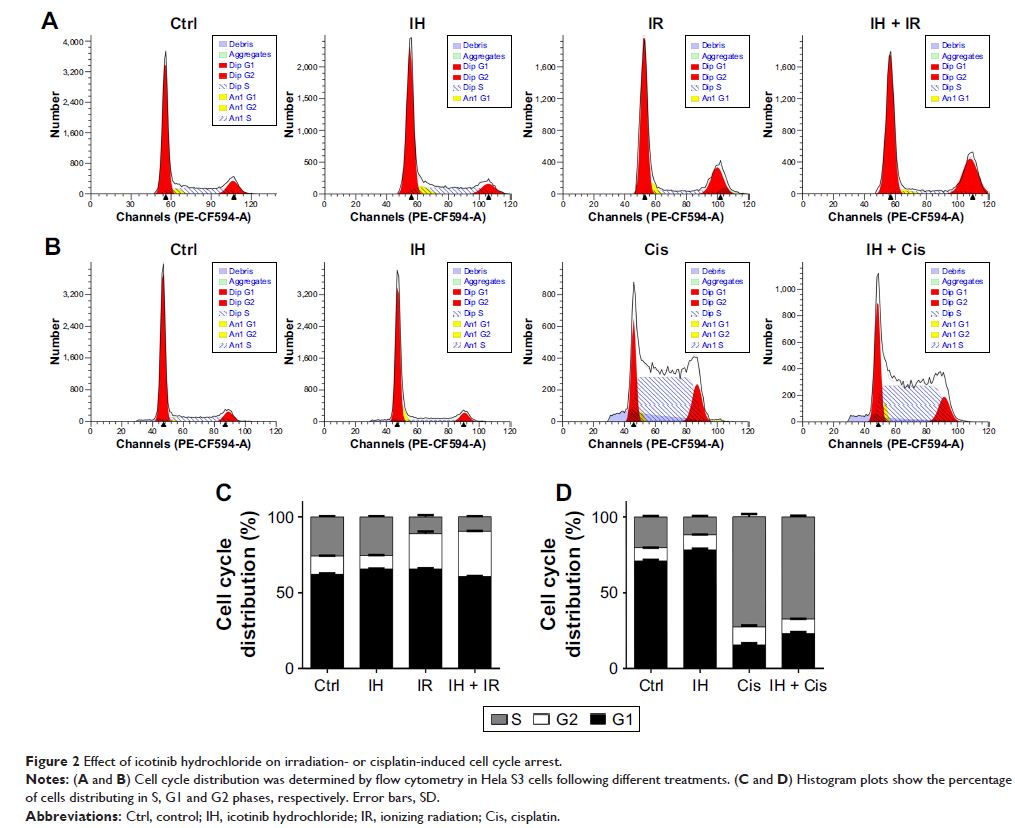108985
论文已发表
注册即可获取德孚的最新动态
IF 收录期刊
- 3.4 Breast Cancer (Dove Med Press)
- 3.2 Clin Epidemiol
- 2.6 Cancer Manag Res
- 2.9 Infect Drug Resist
- 3.7 Clin Interv Aging
- 5.1 Drug Des Dev Ther
- 3.1 Int J Chronic Obstr
- 6.6 Int J Nanomed
- 2.6 Int J Women's Health
- 2.9 Neuropsych Dis Treat
- 2.8 OncoTargets Ther
- 2.0 Patient Prefer Adher
- 2.2 Ther Clin Risk Manag
- 2.5 J Pain Res
- 3.0 Diabet Metab Synd Ob
- 3.2 Psychol Res Behav Ma
- 3.4 Nat Sci Sleep
- 1.8 Pharmgenomics Pers Med
- 2.0 Risk Manag Healthc Policy
- 4.1 J Inflamm Res
- 2.0 Int J Gen Med
- 3.4 J Hepatocell Carcinoma
- 3.0 J Asthma Allergy
- 2.2 Clin Cosmet Investig Dermatol
- 2.4 J Multidiscip Healthc

通过抑制 EGFR 信号传导、减弱 RAD51 表达及其在 Hela S3 细胞中的功能,盐酸伊克替尼可以增强化疗效果和放射敏感性
Authors Wang X, Gu Y, Liu H, Shi L, Sun X
Received 26 September 2017
Accepted for publication 18 January 2018
Published 5 March 2018 Volume 2018:11 Pages 1245—1258
DOI https://doi.org/10.2147/OTT.S152613
Checked for plagiarism Yes
Review by Single-blind
Peer reviewers approved by Dr Amy Norman
Peer reviewer comments 2
Editor who approved publication: Dr Ingrid Espinoza
Background: Radiotherapy and cisplatin-based chemotherapy are currently
considered as standard treatments employed for advanced cervical cancer (CC).
However, patients with local recurrence or distant metastasis continue to have
poor outcomes. EGFR overexpression correlated with chemo/radioresistance, and
disease failure has been well proved in the previous studies. Hence, the aim of
this study was to explore the therapeutic efficacy and underlying mechanism of
the sensitization to radiation or cisplatin of icotinib hydrochloride (IH), a
high-selective EGFR tyrosine kinase inhibitor (TKI), in the Hela S3 human CC
cell line.
Methods: Cell proliferation was measured with cell
counting kit-8 (CCK-8) assay. Flow cytometry analysis was performed to examine
cell cycle distribution and apoptosis. The phosphorylation of EGFR and its
downstream signaling molecules were measured by Western blot analysis. γ-H2AX
foci and RAD51 foci in the cellular nucleus were visualized using
immunofluoresence staining. Expression levels of RAD51 in the whole cells and
subceullar fractions were detected to demonstrate the impact of IH on DNA
repair.
Results: IH can significantly inhibit cell proliferation,
redistribute cell cycle, enhance apoptosis and impair DNA damage response of
Hela S3 cells following radiation or cisplatin treatment through suppressing
the activation of the EGFR signaling pathway and attenuating the expression and
function of homologous recombination (HR) protein RAD51.
Conclusion: This study suggests that IH is a potential
sensitizer in radiotherapy and cisplatin-based chemotherapy for CC and RAD51
may serve as a prognosis biomarker for this combination treatment.
Keywords: icotinib
hydrochloride, cervical cancer, EGFR, radiotherapy, chemotherapy
